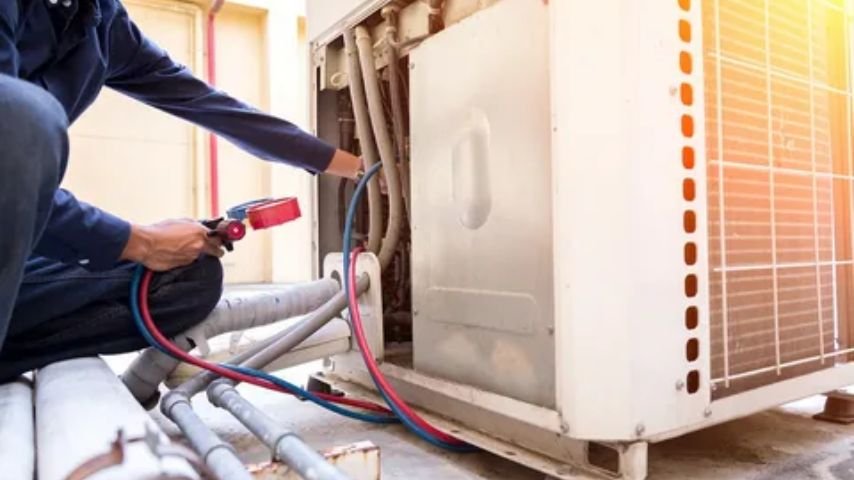Heating, ventilation, and air conditioning (HVAC) systems are essential for maintaining comfortable indoor environments, whether in homes, offices, or industrial spaces. Understanding the components that make up these systems can help you appreciate their functionality and importance. This article will delve into the key HVAC unit components, explain their roles, and highlight the significance of regular maintenance.
What is HVAC?
HVAC stands for Heating, Ventilation, and Air Conditioning. These systems work together to regulate temperature, humidity, and air quality, creating a comfortable and healthy indoor atmosphere. The technology is crucial for energy efficiency and indoor air comfort, making it an integral part of modern architecture.
Key Components of HVAC Units
HVAC systems comprise various components, each with specific functions. Here’s a detailed look at these essential parts:
1. Thermostat
The thermostat is the control center of an HVAC system. It monitors indoor temperatures and communicates with the heating and cooling units to maintain the desired climate.
- Types of Thermostats:
- Manual Thermostats: Require manual adjustment to set the temperature.
- Programmable Thermostats: Allow users to set schedules for heating and cooling, optimizing energy usage.
- Smart Thermostats: Connect to Wi-Fi and can be controlled remotely, learning user preferences to improve efficiency.
2. Furnace
The furnace is a key component responsible for heating the air that circulates throughout a building. It typically operates on natural gas, electricity, or oil. Important parts of a furnace include:
- Burners: Where fuel is combusted to generate heat.
- Heat Exchanger: Transfers the heat to the air flowing through the system.
- Blower Fan: Distributes the heated air through the ductwork.
3. Air Conditioner
The air conditioner cools the indoor air and is crucial for comfort during warmer months. Its main components consist of:
- Compressor: Compresses refrigerant and circulates it throughout the system.
- Evaporator Coil: Absorbs heat from indoor air, cooling it down.
- Condenser Coil: Releases the absorbed heat to the outside environment.
4. Ductwork
Ducts serve as pathways for conditioned air to flow throughout the building. Properly designed and maintained ductwork is vital for efficient airflow. There are two primary types of ducts:
- Supply Ducts: Carry heated or cooled air from the HVAC unit to the living spaces.
- Return Ducts: Bring air back to the HVAC system for reconditioning.
5. Air Filters
Air filters are essential for maintaining indoor air quality. They capture dust, allergens, and other particulates, preventing them from circulating in the air. Regularly changing or cleaning filters is crucial for efficient system operation and improved air quality.
6. Blower Motor
The blower motor powers the fan that moves air through the ductwork. A properly functioning blower motor is essential for maintaining consistent airflow and temperature throughout your home or office.
7. Expansion Valve
The expansion valve regulates the flow of refrigerant into the evaporator coil. It controls the pressure and temperature of the refrigerant, ensuring optimal cooling efficiency.
8. Refrigerant Lines
Refrigerant lines transport refrigerant between the evaporator and condenser. Proper insulation of these lines is critical to prevent energy loss and maintain efficiency.
9. Condensate Drain
The condensate drain removes excess moisture produced during the air conditioning process. A clogged drain can lead to water damage and mold growth, making regular maintenance essential to keep it clear.
10. Heat Pump
A heat pump can function as both a heating and cooling unit. It extracts heat from the outside air during winter and transfers it indoors, reversing the process in summer. Key components of a heat pump include:
- Compressor
- Evaporator Coil
- Condenser Coil
11. Control Board
The control board acts as the central hub that manages signals between the thermostat and various HVAC components. It ensures that all parts work together seamlessly for optimal performance.
Importance of Regular Maintenance
Maintaining your HVAC system is crucial for several reasons:
1. Efficiency
Regular maintenance ensures that all components operate at peak efficiency, reducing energy consumption. A well-maintained system uses less energy, which can significantly lower your utility bills.
2. Longevity
HVAC systems represent a significant investment. Regular maintenance can prolong the lifespan of your unit, saving you money on costly replacements.
3. Air Quality
Regularly changing air filters and cleaning ductwork improve indoor air quality by reducing allergens and pollutants. This is especially important for individuals with allergies or respiratory issues.
4. Cost Savings
Preventative maintenance can identify minor issues before they escalate into major problems that require expensive repairs. Catching issues early can save you considerable amounts of money.
Maintenance Tips for HVAC Systems
To keep your HVAC system running smoothly, consider the following maintenance tips:
- Change Filters Regularly: Check your air filters monthly and replace them every 1-3 months, depending on the type of filter and usage.
- Schedule Annual Inspections: Hire a professional technician to conduct a thorough inspection and perform necessary maintenance tasks each year.
- Clean Ductwork: Dust and debris can accumulate in your ducts over time. Professional cleaning can enhance airflow and improve indoor air quality.
- Monitor Thermostat Settings: Ensure your thermostat is set correctly and functioning as intended to maintain desired comfort levels.
- Inspect Insulation: Proper insulation of refrigerant lines and ductwork is crucial for preventing energy loss.
Conclusion
Understanding the components of your HVAC system is vital for maintaining a comfortable and energy-efficient indoor environment. Each part plays a crucial role in ensuring the system operates effectively. Regular maintenance not only extends the life of your HVAC unit but also improves efficiency and air quality.
For all your HVAC needs, including installation, maintenance, and replacement parts, consider The AC Outlet. Our dedicated team of experts is committed to providing top-notch service and high-quality products to keep your home or business comfortable year-round. Trust us to keep your HVAC system running at its best!




